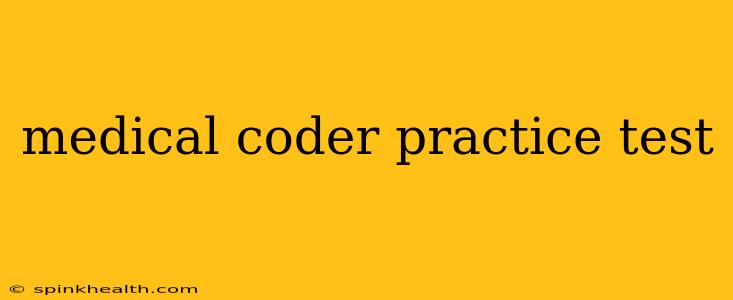Ace That Medical Coding Exam: A Journey Through a Practice Test
The hum of anticipation filled the air. My heart pounded a rhythm only slightly less frantic than the ticking clock on the wall. It was the day of my medical coding practice test, and frankly, I was a bundle of nerves. Years of studying, countless hours poring over code books, and late-night cram sessions all culminated in this moment. This wasn't just a test; it was a gateway to my future.
This wasn't your average multiple-choice exam. This was a journey into the intricate world of medical billing and coding. Each question was a puzzle, demanding precision and a deep understanding of medical terminology, procedural and diagnostic codes, and the nuances of insurance regulations. I needed to navigate this maze with accuracy and speed.
Let's delve into some common challenges and questions that popped up during my practice test, reflecting what you might encounter yourself. Think of this as a virtual study buddy, guiding you through the process.
What are the different types of medical coding systems?
This was one of the first hurdles I faced. Understanding the difference between ICD-10-CM (International Classification of Diseases, Tenth Revision, Clinical Modification), CPT (Current Procedural Terminology), and HCPCS (Healthcare Common Procedure Coding System) was crucial. ICD-10-CM codes describe diagnoses, CPT codes detail procedures, and HCPCS codes cover a wider range, including some procedures not covered by CPT and supplies. Mastering this distinction was key to accurately assigning codes to patient records. I made flashcards and practiced pairing diagnoses with appropriate procedures – a simple yet effective strategy.
How do I choose the correct ICD-10-CM code?
This was where the real challenge began. ICD-10-CM is incredibly detailed, offering a vast array of codes to describe even the most nuanced conditions. Finding the precise code demanded careful reading of the descriptions, considering all the specifics of the patient's diagnosis. I quickly learned the importance of reading the entire index and the tabular list, not just jumping to conclusions. Often, seemingly similar conditions have very different codes, and missing a crucial detail can lead to incorrect billing.
What are some common mistakes to avoid in medical coding?
During my practice test, I realized how easy it was to fall into the trap of "upcoding" (assigning a higher-level code than warranted) or "downcoding" (assigning a lower-level code than warranted). Both are serious errors that can have significant financial consequences. I also had to pay close attention to sequencing – the order of codes matters, particularly when multiple diagnoses are present. Finally, consistently double-checking my work became paramount; a small mistake in one code can snowball into bigger problems.
How can I improve my medical coding speed and accuracy?
Speed and accuracy were inversely proportional in my initial practice attempts. My strategy involved timed practice sessions, focusing on efficiently navigating the code books and refining my code selection process. Regular review of the coding guidelines and participation in mock examinations was incredibly helpful. I also made use of online resources and practice tests. This wasn't about memorization alone but about building a deep conceptual understanding of the system.
What resources are available for medical coding practice?
Beyond the official coding manuals, numerous online resources, practice tests, and even coding software are available. Finding credible sources and utilizing different learning styles proved beneficial for my preparation. I personally benefitted from combining online resources with textbooks and focused practice sessions, tailoring my approach to suit my individual learning needs. Don't be afraid to experiment and find what works best for you.
My journey through the practice test wasn't without its bumps. There were moments of frustration, uncertainty, and the sheer weight of information. But with persistence, meticulous attention to detail, and consistent effort, I transformed my anxieties into confidence. This practice test wasn’t just a trial run; it was a testament to my dedication and a crucial stepping stone on my path to becoming a successful medical coder. Remember, preparation is key. Good luck!

